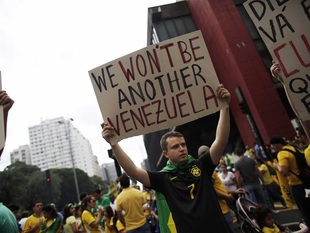
Hundreds of thousands of Brazilians took to the streets this weekend, calling for the impeachment of recently re-elected President Dilma Rousseff.
In sign after sign, middle-class protesters called for the military to wrest control of the country from Rousseff's Brazilian Workers' Party (PT).
Marlon Aymes, a protester seen holding a sign that read "Army, Navy and Air Force. Please save us once again of communism," told The Guardian:
"They [The PT] are in power for 16 years. That is like a dictatorship ... In 1964 the military of Brazil took a stand against a president who was close to the Kremlin. Today, the PT is in a group that wants a Bolivarian socialist model across Latin America. Common people are protesting and calling for impeachment, but congress is too corrupt to approve that so we need military intervention."
The corruption Aymes was talking about has been center stage in Brazilian politics for about the past year. It all surrounds Petrobras, the Brazilian quasi-state oil company. Once a powerhouse, it has been ransacked by the government. The ruling party has used it to pay kickbacks, to finance the government — you name it.
It isn't difficult to see why Brazilians are calling foul, but to call for military rule, however, is a chilling reminder of what has often been a ready alternative in Latin America. Brazil was controlled by a violent military junta from 1964 to 1985. It was that junta that tortured the sitting president when she was a young activist. Calling for the return of military control is a clear signal that some in Brazilian society feel the democratic process has failed.
Despite the corruption, signs within the government point to the contrary. Like it or not, Rousseff was re-elected by Brazilians. It was by a slim margin, but it was indeed a victory. Rousseff won because she promised to continue pouring money into social programs despite the country's ailing economy. Her more conservative opponent, Aecio Neves, said cuts would have to be made. Now in office and faced with prolonged economic malaise, Rousseff is sounding more like Neves, and that is contrary to the platform that got her elected.
 RSS Feed
RSS Feed
